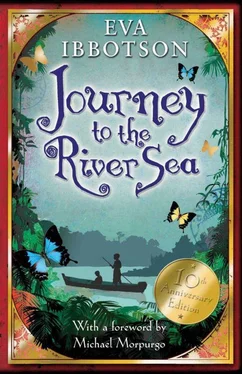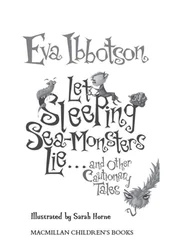‘Don’t you like Shakespeare?’ asked Maia.
Miss Minton gave her a look. ‘I rank Shakespeare as second only to God,’ she said. ‘Which is why I am going to my cabin.’
Clovis didn’t have much to do in Macbeth — Mr Goodley had cut most of the parts with children — but the next day they rehearsed Little Lord Fauntleroy . Maia had read the book. It was soppy, but a good story all the same, and she thought Clovis acted very well. He was the hero, of course, the little American boy who finds he is the heir to a great castle in England owned by his crusty old grandfather, the earl. The boy’s name was Cedric and he called his mother ‘Dearest’ and together they travelled to England and melted the heart of the earl and did good to the tenants and were loved by everyone.
‘I thought you were very good,’ said Maia. ‘It can’t be easy to call your mother “Dearest”.’
‘No, it isn’t. Especially when she’s Nancy Goodley who’d pinch you as soon as look at you.’
‘And your voice didn’t wobble in the least.’
Clovis looked worried again. ‘It had better not! Beastly Lord Fauntleroy is supposed to be seven years old.’
He told Maia that they were staying for two weeks in Belem, the first port on the Amazon and then going on to Manaus. ‘It’s a really good theatre there — usually we wouldn’t get a booking in a big place like that but the ballet company who were going to come had to cancel. We’re putting on a matinée of Fauntleroy every day. If it goes well we might be able to clear our debts but if not—’
‘Of course it’ll go well. And I’m so glad you’re going to play in Manaus because I’ll be able to come and see you.’
It seemed to her really sad that a boy should have to worry about getting spots — and that he shouldn’t be at all excited about travelling to the Amazon. They were sailing into warm waters now; the sun shone day after day and the sea was a brilliant blue, but Clovis hated the heat. When he wasn’t following Maia about and asking her about Yorkshire pudding and apple crumble, he lay under a fan and swatted flies and sighed. ‘I must get back to England,’ he said — and made them tell him about tobogganing and skating on frozen ponds, and muffins afterwards for tea. ‘My foster mother made the best muffins in the world,’ he said.
For Maia it was quite different. When she was small, her parents had taken her along when they went to dig up ancient ruins in Greece and Egypt; she remembered the happiness of being warm even at night and the freedom of the camp. And the closer she got to her destination, the more certain she became that what she had felt there on the ladder in the library was true and that this new country was for her.
‘I’m going to stay with twins,’ she told Clovis. ‘Twins are special, don’t you think? Like Romulus and Remus, though they were brought up by wolves, of course.’
‘If they’re nice it’ll be all right,’ said Clovis. ‘But if they’re nasty you’ll have a double dose.’
‘They won’t be nasty,’ said Maia.
When they had been at sea for nearly four weeks, they came on deck one morning to smell not only tar and engine oil, and the salt in the wind, but a warm, rich, mouldering smell. The smell not just of land but of the jungle — and within a few hours they saw a dark line of trees fringed by surf — and then they steamed into the mouth of the river and put down anchor at Belem.
It was here that the Pilgrim Players left the ship. They disembarked with as many shouts and armwavings as when they came on board. Maia and Clovis hugged each other; she was really sorry to see him go. She gave him her address at the Carters’ so that he could come and see her as soon as he arrived in Manaus.
‘The name of the house is Tapherini . That means “A Place of Rest”, Miss Minton says, so it’s sure to be beautiful,’ she said. ‘The twins will be excited to see a proper actor.’
‘And you’ll come and see me in the play?’
‘I promise,’ said Maia. ‘I absolutely promise.’
Clovis didn’t just hug Maia, he hugged Miss Minton too. It struck Maia that though he was afraid of so many things, he didn’t seem to be afraid of her fierce-looking governess.
The journey down the Amazon was one that Maia never forgot. In places the river was so wide that she understood why it was called the River Sea and they sailed between distant lines of trees. But sometimes they made their way between islands and then, on the sandbanks, they saw some of the creatures that Maia had read about. Once a litter of capybaras lumbered after their mother and they were close enough to see their funny snouts and sandy fur. Once they passed a tree whose roots had been killed by the rise of the water, and its bare branches were full of scarlet and blue parakeets which flew up, screeching, when the boat came past. And once Maia saw a grey log lying in the shallows which suddenly came to life.
‘Oh look,’ she said, ‘A croc— I mean an alligator. My first one!’, and a man standing close by nodded, and said he was glad that she knew there were no crocodiles in this part of the world. ‘You’d be surprised how many people never learn.’
They passed plantations of rubber trees and Indian villages with the houses built on stilts to stop them being flooded when the river rose. The Indian children came out onto the landing stage and waved and called out, and Maia waved back and didn’t stop till they were out of sight.
Sometimes the boat went close enough to the shore for them to pass by old houses owned by the sugar planters or coffee exporters; they could see the verandas with the families taking tea, and dogs stretched out in the shade, and hanging baskets of scarlet flowers.
‘Will it be like that?’ Maia kept asking. ‘They’re sure to have a veranda, aren’t they — perhaps we can do lessons looking out over the river?’
She was becoming more and more excited. The colour, the friendly waving Indians, the flashing birds, all delighted her, and she was not troubled by the heat. But at the centre of all her thoughts were the twins. She saw them in white dresses with coloured sashes like pictures in a book, laughing and welcoming and friendly. She imagined them getting ready for bed, brushing each other’s hair, and lying in a hammock with a basket full of kittens on their laps, or picking flowers for the house.
‘They’ll have a big garden going down to the river, don’t you think?’ she asked Miss Minton, ‘and a boat with a striped awning probably. I don’t really like fishing because of the hooks but if they showed me… I suppose you can live off the land in a place like that.’
Since the letter the twins had written to her was only two sentences long, Maia was free to make up their lives, and she did this endlessly.
‘I wonder if they’ve tamed a lot of animals? I should think they would have, wouldn’t you? Coatis get very tame — or maybe they’ll have a pet monkey? A little capuchin that sits on their shoulders? And a parakeet?’ she asked Miss Minton, who told her to wait and see, and set her another exercise in her Portuguese grammar.
But whatever Miss Minton said made no difference. In Maia’s head the twins paddled their boat between giant water lilies, trekked fearlessly through the jungle, and at night played piano duets, sending the music out into the velvet night.
‘They’ll know the names of everything too, won’t they? Those orange lilies; no one seems to know what they’re called,’ said Maia.
‘The names will be in a book,’ said Miss Minton quellingly, but she might have spared her breath as Maia wandered further and further into the lives of Gwendolyn and Beatrice.
‘They’ll shorten their own names, do you think? Gwen perhaps? And Beattie?’
Читать дальше












